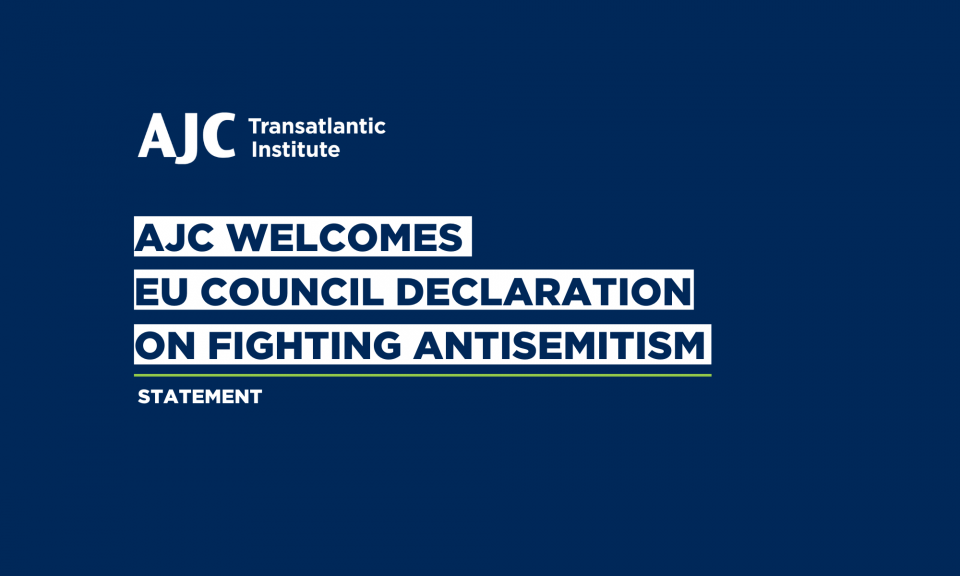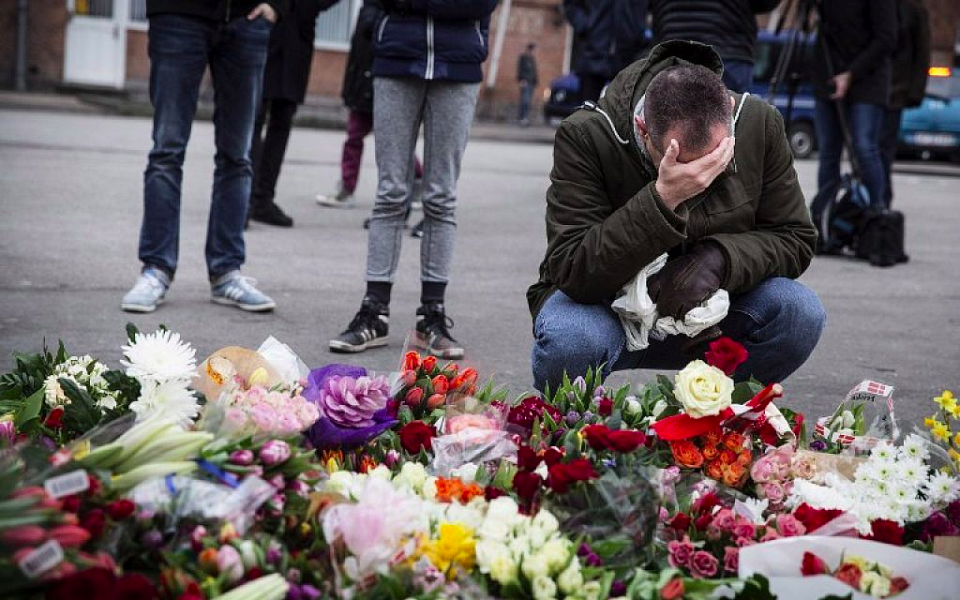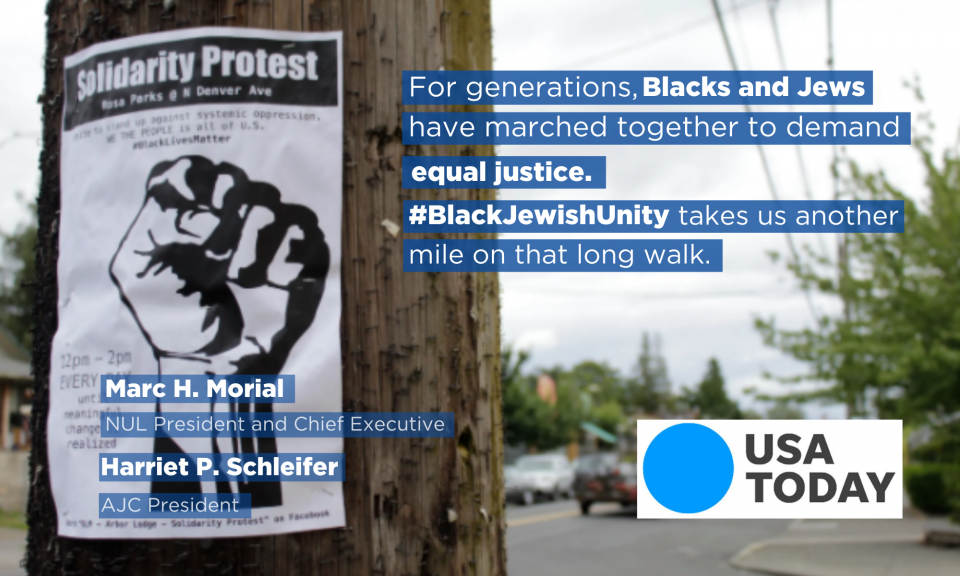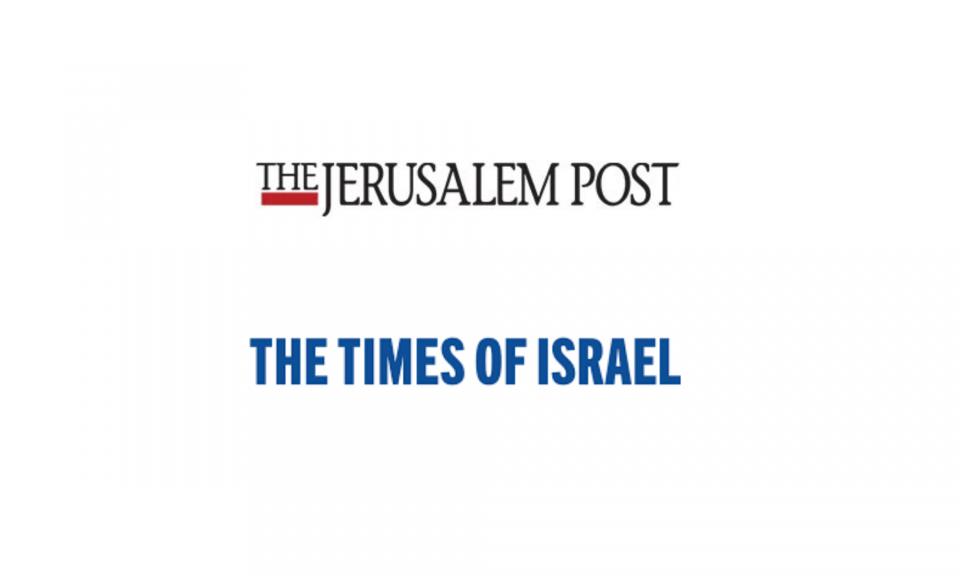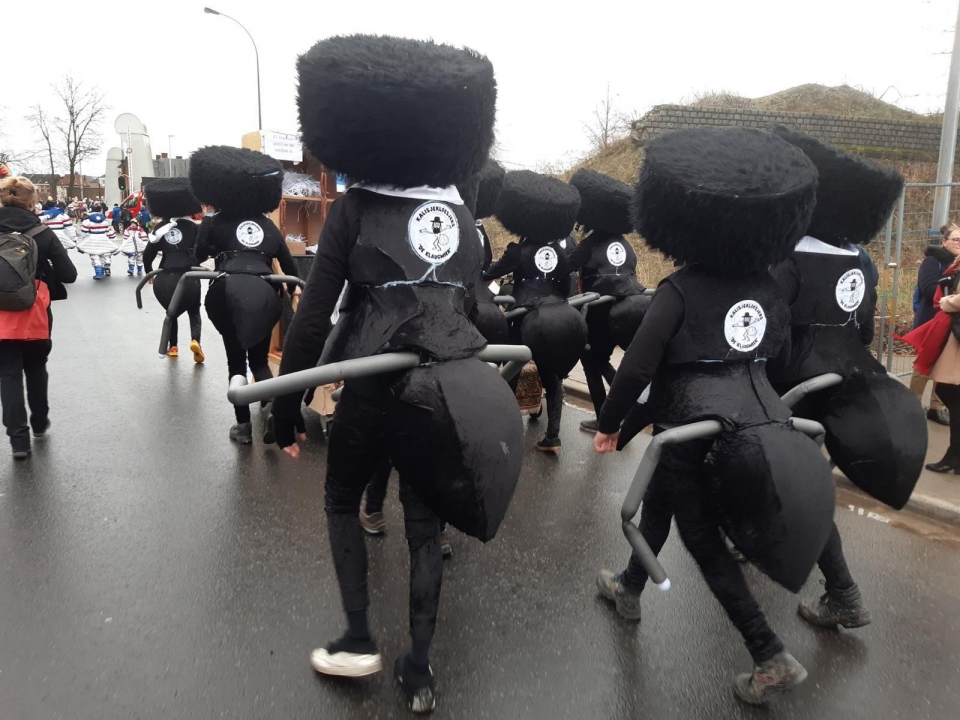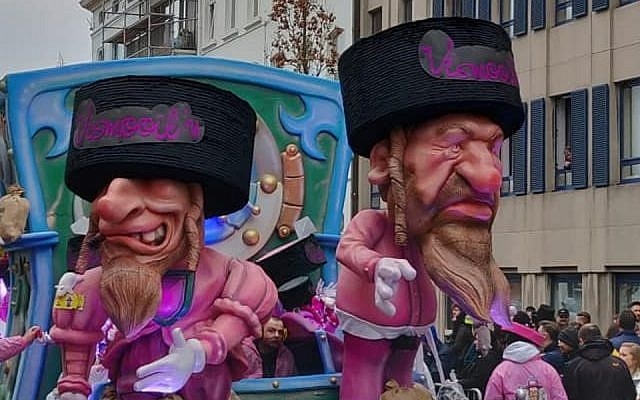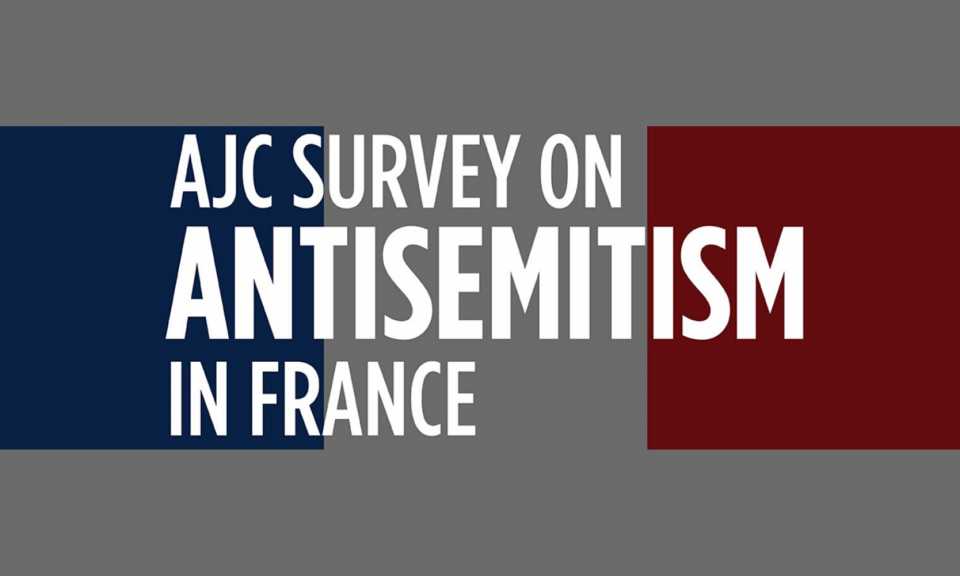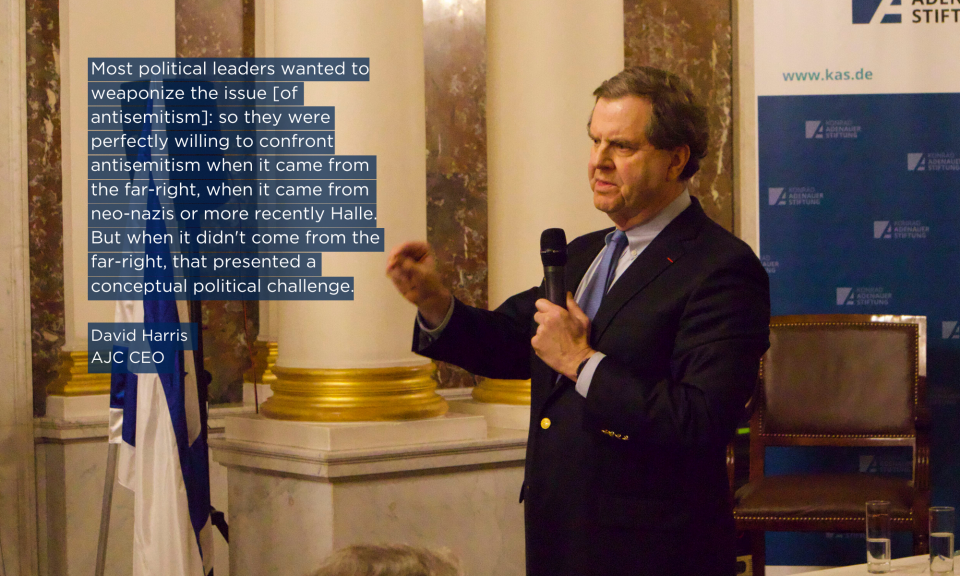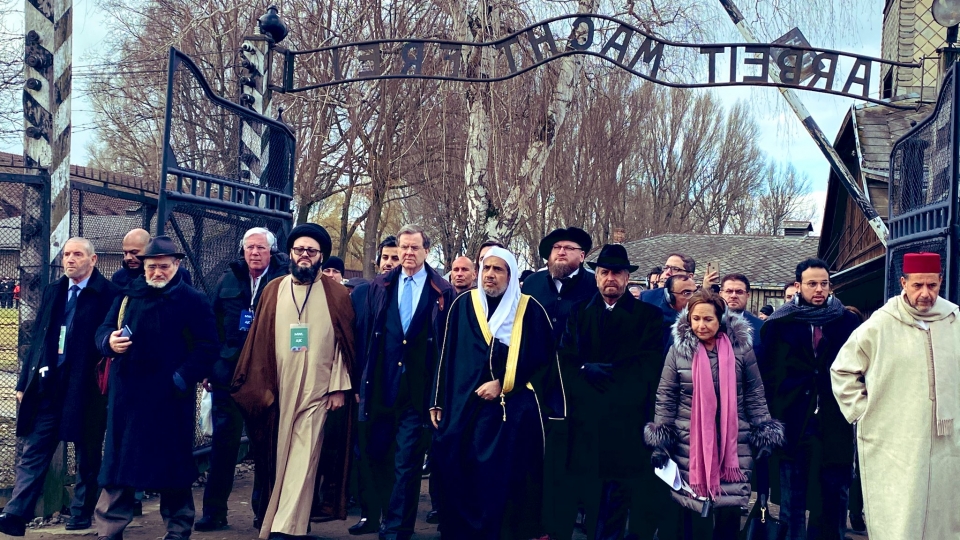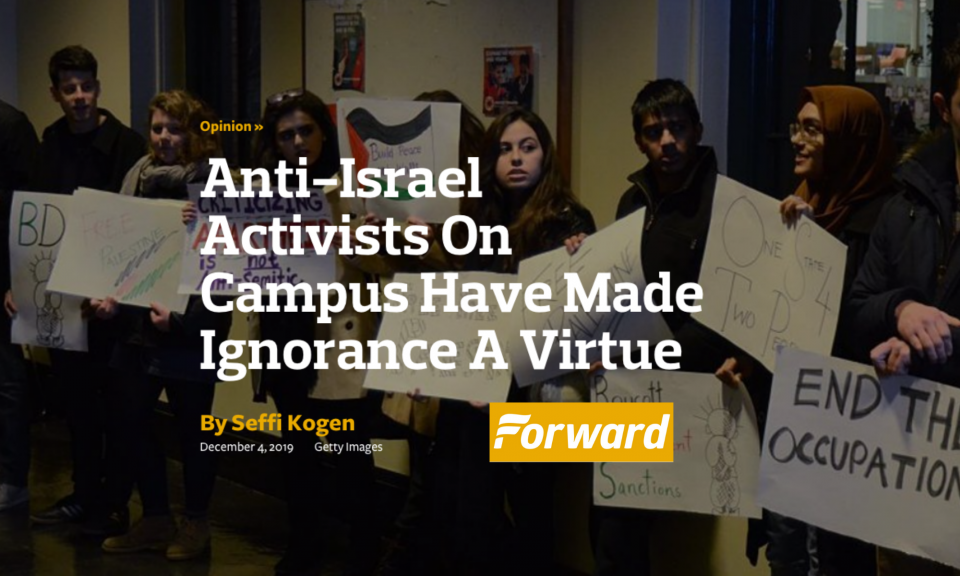Video
Powerful Holocaust Remembrance Speech by Vice President Schinas
EU Commission Vice President Margaritis Schinas delivered a powerful keynote address at an International Holocaust Remembrance Day event co-organized by the AJC Transatlantic Institute. Seventy-five years after the liberation of Auschwitz, Vice President Schinas underlined Europe’s collective duty of remembering the past and fighting the current resurgence of antisemitism, including by implementing the International Holocaust Remembrance Alliance (IHRA) definition.
Brussels, 28 January 2020
Your Excellencies,
Ladies and gentlemen,
Dear colleagues and friends,
Thank you for your warm welcome, and for the honour of being with you tonight, to commemorate the 75th anniversary of the liberation of Auschwitz.
As a former chief spokesperson, and as someone active in politics for over 30 years, I have spent more hours than most on a podium like this.
Yet faced with the Shoah, words fail us all.
How can a speech ever encapsulate the unfathomable horrors of the Holocaust?
How can any one of us ever fully grasp the terror suffered by the victims of this abominable crime – unprecedented and unparalleled in scale and atrocity?
How can we go beyond commonplace statements, and meaningfully draw lessons to make sure this never happens again?
It is by no means easy.
But it’s imperative.
Yesterday – together with the President of the European Council and my fellow Vice-President, Vera Jourova – I represented the European Union at the commemoration ceremony at Auschwitz.
A place that has become the symbol of the abyss of humanity, of the darkest time in our history, the lowest point of our civilisation.
But also, a symbol of perseverance.
The stories of survivors, those tortured in concentration camps – but also the stories of those in the agony of hiding, like you, Baron Julien Kleiner – are testament to the immeasurable strength of the Jewish people. To the resilience and determination of people deprived of food, in the bitter cold, deprived of their humanity, to live and to build up new lives after the Holocaust. To refuse to become a mere number.
During the heart-wrenching walk through the camp, I was particularly struck by George Santayana’s sentence on the wall: ‘Those who cannot remember the past are condemned to repeat it.’
And therein lays the importance of remembrance today.
Holocaust survivors have contributed immensely to preventing history from repeating itself, by tirelessly revisiting and sharing their painful stories. But we have to realise that of the nearly 200 survivors present at yesterday’s ceremony, many may not be there for very long to tell these stories.
The duty to never let their memory fade, the duty of remembrance, is a duty that we must all bear.
This is the first of three key messages I wish to leave with you tonight, in light of the important discussion that follows:
We must continue to tell the stories – and to tell them as they really happened.
As part of the International Holocaust Remembrance Alliance, we ‘pledged to victims and survivors (…) that their legacy will be kept alive.’
That must be more than a promise.
We have to keep our window into the past open. The memory of the Shoah lives on in the descendants. We must listen to the voices of the second and third generation of survivors whose lives have also been profoundly shaped by the experiences of their parents and grandparents.
A third of Europeans know just a little or nothing at all about the Holocaust, and one in 20 has never even heard of it.
It is therefore vital to invest in education and awareness raising. To teach our children, inform our citizens, train our law enforcement and judiciary about the Holocaust, but also about the many forms of antisemitism that plague our societies still to this day.
We must continue to research and record the facts, and to make them widely available, taking full advantage of the digital tools now at our disposal. Initiatives like the European Holocaust Research Infrastructure, supported with 19 million euros from the EU budget since 2010, are essential to link the facts, figures and memories across Europe and to promote independent research.
In this way, we can successfully resist the attempts of those who seek to rewrite the past for reasons of political expediency. Whoever denies or distorts the Holocaust puts all achievements of the last 75 years into question. Everyone is entitled to their own opinion, but not to their own facts.
We must realise that the Shoah is not just history – it is our history
For those too young to remember the Second World War, it’s dangerously easy to think of antisemitism as a thing of the past, or as a solely Jewish problem. The focus of commemorations in Auschwitz and in Jerusalem may give the illusion of the Holocaust being something very remote, something that happened far away from our homes, something that happened only in concentration camps and shooting pits in Nazi-occupied territories of Eastern Europe.
But the history of the Holocaust is a universal one.
Traces can be found all over the world – wherever survivors found refuge and the strength to build a new life.
They can be found all across Europe: here in Brussels or in my own hometown of Thessaloniki – once a thriving centre for Sephardic Jewish life, a Jewish majority city called “la madre de Israel” thanks to its ladino-speaking community.
Over 50,000 of my compatriots were murdered in Nazi extermination camps – more than 90% of the total Jewish population of the city.
The Holocaust is our local history. A history each and every one of us has to discover and internalise its lessons.
We must call out antisemitism in all its forms
The Shoah did not start in the gas chambers. Nor did antisemitism vanish with the evacuation of the Nazi death camps.
The Holocaust was the peak of thousands of years of discrimination, persecution and pogroms against Jewish communities. The accumulation of decades of indifference towards lies, absurd laws and regulations, blatant injustices – simply because they concerned “others”.
For those who managed to escape extermination, the months and years that followed were often filled with yet more pain and torment. The liberation meant freedom, but not the end of suffering.
Last night, I was sitting across Ηolocaust survivors Gabor Hirsch and Tova Friedman, one of the youngest children to come out alive from the hell of Auschwitz. I listened to her speak about what came next… About liberators who became captors; about the perpetual fear of being attacked; about the shame of feeling unwelcome by former neighbours and friends; about the sense of guilt for having survived while so many others perished; and about the long and agonising journey to safety.
Accounts like this are a warning of the many forms that antisemitism can take. Of how it can gradually poison societies. And of how difficult it is to eliminate.
After the Holocaust, outright antisemitism became ostracised, politically incorrect. However, the sentiments and stereotypes remained. Jew-hatred continues to lead to discrimination, abuse and murder.
Nothing excuses antisemitism, whether it comes from neo-nazis, far-right or far-left extremists, or radical islamists; whether masked as antizionism or historical revisionism.
State authorities bare a particular responsibility to identify and address such phenomena. One thing must be clear: in the face of hatred, the State must always side with the victim.
As we see Jewish communities under pressure again today, we must stand up against it. Raise our voices and redouble our efforts to ensure Jewish Europeans can go about their lives free from the threat of antisemitism.
The memory of the Holocaust is at the very core of the European project. It drove our founders, like Simone Veil, Auschwitz survivor and first President of the European Parliament, to pursue a peaceful, democratic and united Europe that stands up for human rights and human dignity, and for the freedoms of religion and expression. A Europe that protects its Jewish communities and all other minorities. A bulwark against racism, xenophobia and all forms of hatred.
In December 2018, the Council adopted a Declaration inviting all EU Member States to develop comprehensive strategies against antisemitism. Appointing a special envoy on antisemitism and adopting the International Holocaust Remembrance Alliance (IHRA) definition – so far endorsed by 16 of our Member States – are important steps in the right direction. We count on the upcoming German Presidency of the IHRA, which will also coincide with their Presidency of the EU in the second half of 2020, to help accelerate progress.
To accompany and assist Member States in these efforts, President von der Leyen has entrusted me with leading the Commission’s fight against antisemitism.
With a vice-presidential portfolio that encompasses – for the first time – policies ranging from internal security, to education and culture, to interfaith dialogue, I am determined to put my full weight behind this cause. We are setting up a reinforced team under our Coordinator on antisemitism, Katharina von Schnurbein. And we will continue to work intensely through our dedicated working group, which brings together Member States authorities and Jewish communities.
Ladies and gentlemen,
Remembrance today goes beyond just “talking about dead Jews”, as David Harris told me when we met in December, just a few days after the start of my mandate. Protecting living Jews is no less significant. It requires concrete measures against antisemitism, with the ultimate aim of ensuring normality of Jewish life across Europe.
At yesterday’s commemoration, Holocaust survivor Marian Turski chose to address his message to his daughter and grandchildren.
He urged them to remember that the Shoah did not “fall from the sky”. That the dehumanisation started with seemingly inconsequential prohibitions: for Jews to sit on certain park benches, do their shopping during daylight hours, or go to the swimming pool.
He recalled the foundation of the Judaeo-Christian tradition, common to so many of us Europeans: the Ten Commandments. And he prompted the next generation to add an eleventh one: “Thou shalt not be indifferent”.
I took that message to heart.
Against the rising scourge of antisemitism, Europe cannot – and will not – stay indifferent.
Not this time.
Not ever again.
